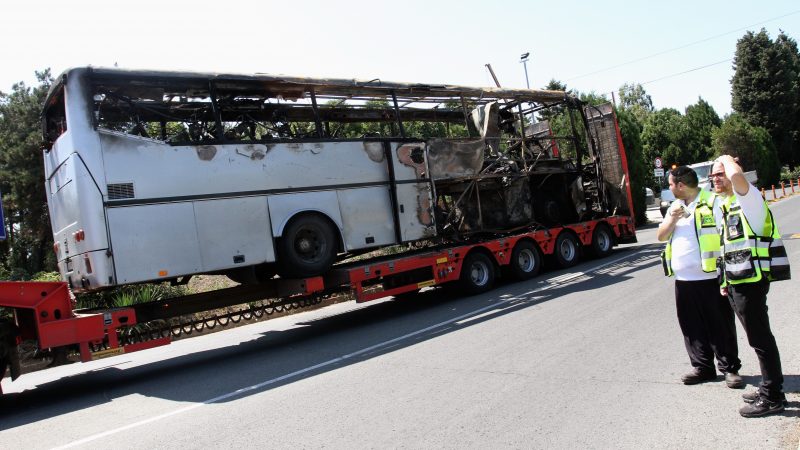Bulgaria should designate Hezbollah in its entirety as a terrorist organization
Toby Dershowitz and Dylan Gresik/EU Reporter/December 17/2020
توبي ديرشوفيتز وديلان جريسيك /مراسل الاتحاد الأوروبي: على بلغاريا تصنيف حزب الله بأكمله كمنظمة إرهابية
When Mustafa Kyosov arrived at work on 18 July 2012, he did not expect it to be his last day on the job. Originally from Yurukovo in southwestern Bulgaria, Kyosov worked as a tour bus driver around the popular resort city of Burgas on the Black Sea. The hardworking Bulgarian was helping Israeli tourists board his bus at the Sarafovo airport when a bomb placed by an operative of the Iran-backed terrorist group Hezbollah exploded write Toby Dershowitz and Dylan Gresik.
Kyosov and five Israelis, including a pregnant woman, were killed, and nearly 40 others were physically injured. Many more were left psychologically wounded, as witnesses described the blast sending body parts and blood flying through the air.
After eight years, on 21 September, a Bulgarian court convicted two Hezbollah operatives, Meliad Farah and Hassan El Hajj Hassan, for providing the explosives and logistical support for the attack, sentencing them in absentia to life in prison without parole. For Kyosov’s grieving parents, the sentences are not enough. And it should not be enough for Bulgaria either.
“He left at the age of 36 – left his child, left his wife, and left us alone,” said Mustafa’s mother, Salihe Kyosova, according to 24 Chasa. “Nothing will bring him back; it doesn’t matter what the sentences are.”
Immediately after the bombing, while the Bulgarian government’s thorough investigation determined that Hezbollah was responsible for the attack, in its 2020 trial the court did not name or indict Hezbollah . The Lebanon-based terrorist group’s logistical and financial support of the bombers enabled it to carry out this deadly attack on Bulgarian soil that claimed the life of a Bulgarian citizen.
The conclusive evidence forced the European Union to acknowledge the organization’s threat to the continent – with the EU designating the group’s so-called “military wing” as a terrorist group in 2013. This partial designation, which hinges on a false division of the unitary entity, left a gap in the EU’s efforts to hold Hezbollah accountable.
While the court’s recent verdict of these two operatives is an important first step, Bulgaria is now at a crossroads.
Bulgaria can acquiesce to intimidation by Hezbollah, as some European countries have done, fearing retribution for sanctioning the organization. These governments may wrongly believe that by settling for a partial designation, they can avoid future attacks.
Or Bulgaria can take a different path. Designating Hezbollah as a terrorist organization in its entirety – in addition to freezing its financial assets, banning fundraising activities, and expelling its members – would help undermine Hezbollah’s legitimacy and protect the EU’s citizens.
Since the 2012 attack, momentum to hold Hezbollah accountable has been building throughout the world. Bulgaria, and the EU itself, have an opportunity now to close the accountability gap.
Confronted with indisputable evidence of Hezbollah’s malign activity on its own soil, a once-hesitant Germany recently sanctioned the group in its entirety. Latvia, Lithuania, Slovenia and Serbia have also recently banned the terrorist group. In recent weeks, Estonia, Guatemala, and Sudan have done the same, joining the United States, Canada, Argentina, Bahrain, Colombia, Honduras, Israel, Kosovo, the Netherlands, Paraguay, and the United Kingdom. Worldwide, over 15 countries – along with the Arab League and the Gulf Cooperation Council – have designated the entirety of Hezbollah.
The government of Bulgaria has the ability to do so as well. Its Council of Ministers can add the entirety of Hezbollah to the sanctions list under Bulgaria’s anti-terrorism laws.
Doing so would not only be an important measure of justice for the victims but also for Bulgaria itself. Bulgaria’s 2016 decision to add Farah and Hassan to its terrorism list was a step in the right direction.
In September, a US official announced that since 2012, Hezbollah has stored and transported ammonium nitrate throughout Europe – the explosive ingredient used in the Burgas attack. Since 2015, authorities in the UK, Germany, and Cyprus have seized stockpiles of ammonium nitrate, reportedly intended for use by the terrorist group.
Ammonium nitrate is the chemical compound that caused the massive August 4 explosion in Beirut, which killed nearly 200 people and caused billions of dollars of damage. In response, the Lebanese people have spoken with their feet and their voices: Years of fear and accommodation have given way to widespread demonstrations to protest Hezbollah’s terrorism, corruption, and malfeasance in Lebanon.
The time is right to reemphasize a new approach to stop Hezbollah’s malign conduct and not allow Hezbollah to operate with impunity on European soil.
There is no compensation or sentence that can bring back Mustafa Kyosov or the five Israeli tourists. To ensure true accountability, pursue lasting justice, and deter future terrorist attacks on its soil, Bulgaria can, however, designate Hezbollah in its entirety and encourage its EU partners to do the same.
*Toby Dershowitz is senior vice president for government relations and strategy at the Foundation for Defense of Democracies, where Dylan Gresik is a government relations analyst. Follow them on Twitter @tobydersh and @DylanGresik. FDD is a non-partisan think tank focusing on national security and foreign policy.

















